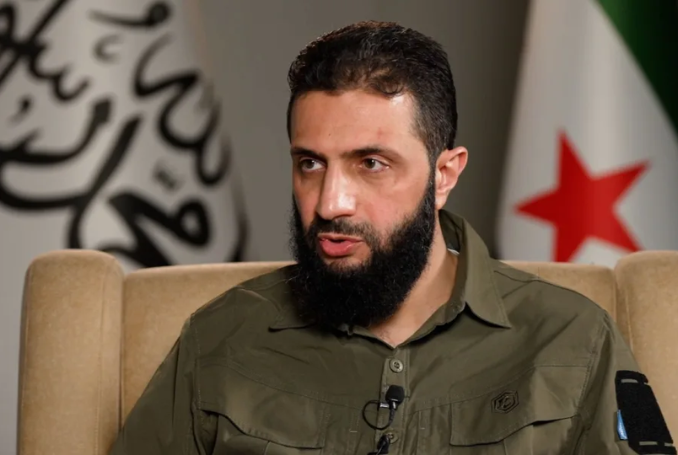
We have reached the point where there can no longer be any denial. Syria’s new leadership has repeatedly signalled its willingness to sell out the Palestinian people, just to get in the US’ good books.
From launching anti-Palestinian crackdowns to repeatedly expressing interest in normalization, Damascus is pursuing collaboration with a regime carrying out a genocide.
The most recent revelations from two US congressmen, that Syrian President Ahmed al-Shara’a is seeking to join the so-called ‘Abraham Accords’ and normalize ties with Israel, have sparked outrage amongst many Syrians, while loyalists of the new administration continue to make excuses.
Unfortunately, due to the divisive nature of the Syrian issue, there are very few willing to perform any kind of critical analysis of the decisions taken by the newly-instated government in Damascus. If you attempt to do this, you are instantly framed as an ‘Assadist’ or that you are undermining the Syrian people.
This toxic way of approaching the issue needs to be changed, and the facts must be established. It is a similar tactic used by Zionists, who claim that by criticizing Israel, you are being antisemitic.
In addition to this, no amount of appeals to listen to the alleged popular will of Syrians will work as a moral argument for a government willing to collaborate with the regime committing a genocide against the people of Gaza. What is being done to the Palestinian people at this time represents one of the worst atrocities since World War 2.
If Ahmed al-Shara’a does normalize ties with Israel, he and his regime will be complicit in the genocide of Palestinians, the occupation of the Holy sites in al-Quds, and the surrendering of Syrian lands, which Israel will never relinquish unless forced to do so.
Saudi Arabia, which was on the verge of normalizing ties with the Israelis prior to the Gaza genocide, has not even signalled that it would stoop so low.
A Pro-Israeli Government in Damascus?
Since the fall of Bashar al-Assad’s government on December 8, when Hayat Tahrir al-Sham (HTS) officially took control of Damascus, the new Syrian leadership has continually released statements and taken action in favour of Israel.
The most recent report regarding Ahmed al-Shara’a’s willingness to normalize ties with Israel cites US officials Cory Mills, who serves on the House Foreign Affairs and Armed Services committees, and Congressman Marlin Stutzman. This came following their trip to Damascus.
President al-Shara’a did not deny these reports. In fact, Syria’s Foreign Minister Asaad Hassan al-Shibani commented on Friday that “we have repeatedly emphasized that Syria will not pose a threat to any country, including Israel.” Shibani previously stated that Israel is “a proven fact” and indicated that under the correct circumstances, there could be a Damascus-Tel Aviv dialogue.
In late December, the newly-instated Mayor of Damascus, Maher Marwan, called for normalization with Israel. Marwan defended his stance in an interview with NPR. “Our problem is not with Israel,” he stated, adding, “We don’t want to meddle in anything that will threaten Israel’s security.”
In fact, in Ahmed al-Shara’a’s first interview since instating himself as Syrian President, which he gave to The Times (UK), he took the opportunity to pledge that Syria will not engage in “any conflict whether with Israel or anyone else and we will not let Syria be used as a launchpad for attacks.”
The excuse for this rhetoric is that “the Syrian people need a break”, yet armed clashes and sectarian massacres continue to occur across Syria, as the nation has failed in four months to unite under one banner and instead is divided across its various regions.
On top of this, armed militia forces affiliated with the new Syrian authorities have repeatedly clashed with Lebanese clans, Palestinian resistance forces, and even the Lebanese Army.
While the people of Dara’a have risen up on at least two occasions to combat Israeli invading forces in southern Syria, the only armed action taken in the nation’s south by the new Syrian security forces has been against Syrian factions, attempting to force disarmament.
Damascus, in line with Israeli orders to completely disarm the nation south of the Capital, has focused its armed efforts there, while militant groups allied with the HTS-led government continue to retain their weapons.
Israel began a massive bombing campaign – the largest in the Israeli air force’s history – across Syria immediately upon the fall of Bashar al-Assad. It also invaded Syria, expanding its occupation of the Golan Heights and seizing the strategic high ground at Jabal al-Sheikh, while also placing 6 major water sources of Syria’s south under its control.
Israel has killed hundreds of people throughout Syria since December, including committing assassinations against security units affiliated with HTS. However, the few statements released that address the ongoing invasion, ethnic cleansing of villages, erecting of checkpoints, and airstrikes have never threatened any consequences. In fact, these government statements are often accompanied by complaints about how Iran and Hezbollah are no longer in Syria and, therefore, there is no reason to attack.
Yet, on the other hand, whenever the Syrian government is challenged on its inaction in the face of the suffering of Syrians in the nation’s south, its media apparatus and spokespeople quickly jump to blame Iranian conspiracies that seek to drag Damascus into a costly confrontation.
Meanwhile, the Syrian intelligence has been working to crack down on pro-Palestine resistance action. The latest case is the arrest of two leaders of the Palestinian Islamic Jihad (PIJ) movement, Yasser al-Zafri and Khaled Khaled. For some time, it was unclear why exactly they were arrested.
The excuse then produced was that they were in possession of unregistered weapons, which, if this rule was going to be applied equally, would mean the arrest of tens, perhaps hundreds of thousands of people.
This claim about unregistered weapons wouldn’t be quite as laughable if Ahmed al-Shara’a had not just announced that, in order to stop the huge number of foreign fighters inside the country from committing terrorism, he may have to naturalize them as Syrian citizens.
Under the previous Syrian leadership, Israelis were also banned from entering the country, and citizens were charged if they communicated with them, let alone called for normalization.
Yet, under the rule of Ahmed al-Shara’a, not only can Israelis now visit, but a journalist working for Israel’s Channel 12, Itai Anghel, was taken by the new Syrian security forces on a friendly tour of military sites, the remains of the former Iranian embassy, and was even shown previously classified documents. Meanwhile, Syrian journalists give interviews to Israel’s public broadcaster KAN, calling for “peace” with Israel.
Debunking the Excuses
The most common excuses that are presented by loyalists to the new Syrian leadership fall into the following categories:
5Dimensional Chess: “The President is trying to lift US sanctions, and he is making sacrifices to do so, but he has a grand plan.”
Whataboutism: “But Assad and Hafez al-Assad never attacked Israel, so why should Ahmed al-Shara’a?”
Imagination: “When Syria becomes powerful, then it will defeat Israel.”
Sectarianism: “The Iranians are the real enemy seeking a Sunni genocide.”
Victimhood: “The Syrian people are tired of war, how dare you question the saviour leader!”
Below, I will address each point and show how none of these arguments make any sense, even if you are to view the issue from a Syrian-centric approach that completely sidelines all religious, moral, or national causes, simply considering the predicament of the nation from a materialistic and economic perspective.
The first excuse often offered to explain away all of the government’s dealings with Western nations and statements from its officials regarding Israeli normalization is perhaps the most difficult to disprove, as it relies on faith in the leaders’ intentions.
Nevertheless, the reality, as it stands, is that the US is demanding a range of concessions from Syria if it is going to lift the sanctions, not only limited to Israeli normalization. Over the past month, right-wing Washington-based think tanks, which have influence over the Trump administration, have started to criticize Ahmed al-Shara’a and his failure to implement his various pledges upon taking power.
In addition to this, there is no real indication that Israel is even willing to normalize with it yet and is instead seeking to impose its plot to occupy key segments of southern Syria, establish relations with potential proxy forces, demilitarize the south, and put itself in the most powerful position possible.
Far from a 5D chess move, Syria would be entering into discussions with Israel without anything to use as leverage. In order to understand this better, take Egypt’s Anwar Sadat, although he had lost the 1973 war, Israel would have been defeated if it wasn’t for the US’ aid, and was willing to trade the occupied Sinai Peninsula in exchange for removing the strategic threat posed to it from Cairo. What does Syria have to offer? A meaningless deal to end US sanctions and possibly stop airstrikes, which Israel will undoubtedly fail to comply with?
In order to believe that this is some kind of power play, you would first have to demonstrate that Ahmed al-Shara’a has leverage, which, by claiming he needs to normalise ties just to ease the economic suffering in his country, he admits he doesn’t have. Suggesting normalization in exchange for lifting sanctions is an admission of weakness and will mean concessions for the sake of concessions.
Additionally, Israel does not want a strong Syria and will take all action necessary to prevent that from happening, as we are currently witnessing. Even neighboring Jordan, which has its domestic security situation under control, is now suffering economically and politically. Another great example is that of Egypt, which did gain territory from its agreement. Look at the state of the country now: Did the conditions of Egyptians or Jordanians get better with normalization?
The whataboutism argument is normally premised on what people claim Bashar al-Assad and his father did or didn’t do. In order to save time, as the history is mixed and there are certainly issues between both governments and various Palestinian movements, let’s deal with the commonly repeated claim that Bashar and Hafez “never attacked Israel”.
Hafez al-Assad launched the most successful war ever waged against Israel by Arab State powers in 1973, temporarily liberating the occupied Golan Heights as Egypt retook the Sinai. As for under Bashar, in 2017, there were strikes ordered against Israeli military positions in the Golan Heights, and its air defences also brought down an Israeli fighter jet. While Syria stopped responding to Israeli attacks in 2018, it is factually false to say it never attacked Israel.
It cannot be disputed that Bashar al-Assad failed to properly protect his country from Israeli attacks and that he even prevented Iran-backed armed groups from launching attacks out of southern Syria, yet claims that these two former Presidents never attacked Israel are false.
Then we have the dreamers, people who believe in Ahmed al-Shara’a to the point of idolatry and without any indication of this, think blindly that he will normalize ties with the Israelis as a trick, so that he can then build a strong military and defeat Israel. Most of the reasons why this argument begins to fall apart were already addressed above.
Next up is the sectarian argument that presents Iran and its allies – Hezbollah, Ansarallah, and the Iraqi PMF – as the true enemies of Syria. In essence, this is the exact argument used by the Israelis and Americans, however, it is extremely popular largely due to the horrors inflicted during the course of the Syrian War.
This argument is also not new and is why Israel began providing military, financial, and medical support to some dozen Syrian opposition groups during the civil war. One of those groups that Israel backed was al-Nusra, which later changed its name to Hayat Tahrir al-Sham (HTS), led by Ahmed al-Shara’a (who then called himself Abu Mohammed al-Jolani) as the Syrian branch of Al-Qaeda.
There can be no denial that serious sectarianism plagued Syria throughout the war, with all sorts of foreign militia forces operating there and various massacres occurring on both sides. Countless documented cases exist.
While Bashar al-Assad’s former regime was largely run by corrupt officials who were Sunni, some of whom are now working under the rule of al-Shara’a, there were many cases of sectarian violence and even ethnic cleansing. To be clear, the majority of the massacres carried out explicitly on sectarian groups were conducted by al-Qaeda affiliates like al-Nusra and Daesh.
However, a common sectarian argument employed in favour of al-Shara’a is that Iran committed a Sunni genocide. Many historical revisionists even claim “one million Sunnis were killed”. So let’s evaluate this allegation.
The highest estimate offered for the total number of war deaths, over the course of 13 years, comes from the Syrian Observatory for Human Rights (SOHR). According to the SOHR’s data, 618,000 people were killed in total, 164,223 of which were civilians.
If we go with the highest possible death toll available, from the SOHR that took a favourable view to the opposition, it clearly shows that the large majority of the Syrian war deaths were combatants.
The civilian death toll breakdown lists 122,695 men, 15,671 women and 25,857 children, over 13 years of conflict, and were killed by all sides; the largest portion of the deaths was attributed to the Syrian government and its allies.
According to reports, forces aligned with Assad carried out around 50 total, explicitly sectarian massacres. For reference, more separate sectarian massacres have occurred in Syria since al-Shara’a took power.
It is undeniable that the horrors of the Syrian conflict have left deep mental scars on its people, the kind of trauma that can spark intergenerational hatred, yet the sectarian propagandists who try to overinflate the statistics to argue in favor of Israeli normalization do so with an agenda.
The idea that a Sunni genocide occurred and that Iran still intends to carry out such an atrocity lacks any evidence. Simply put, this is a religio-nationalist argument that works to serve as an excuse for otherwise inexcusable actions.
Another commonplace argument is that Syrians are tired of war, a very valid point and a reasonable position to take. Yet, normalization with Israel does not promise prosperity in Syria at all, for the above-mentioned reasons pointed out in this article.
In reality, instead of seeking peace for the Syrian people, what the government would be doing is opening relations with a nation that is committing a genocide against a population which are actually almost entirely Sunni Muslims.
This means giving up all national considerations, abandoning thousands of Syrians in the Golan Heights who still view themselves as Syrian, while working to combat the only forces in the entire region that actually challenge Israel.
In only 18 months, the very lowest accepted death toll in Gaza is around 52,000, with another 14,000 missing (assumed dead), about 70% of whom are women and children. All of them were killed by one side, Israel, and almost all of them are Sunnis, although in this context, nobody mentions the Sunni element.
The largest estimates of the death toll in Gaza range up to 300,000 for reference. Based on the lowest Gaza death toll, if you want to make it proportionate to Syria in current population size, this would equate to over 520,000 killed in just 18 months.
Arguing in favour of normalization, purely based upon economic interests alone, there is no guarantee that it will achieve the long-desired peace that Syrians deserve. The other regional examples reflect the very opposite. On the other hand, Syria’s leadership is then openly involved in the genocide of Palestinians.
So then the counterargument would go? Are Palestinians not tired? And if so, why do they refuse to bow down to their occupiers?
On no level does it make any sense for Syria to normalise ties with Israel at this current point in history. It does not offer long-term security, economic, or territorial gains, and is a betrayal of all the region’s held to religious, political, and moral obligations. The only ones who seek to benefit from such an agreement are those in power; ie. Ahmed al-Shara’a personally.

– Robert Inlakesh is a journalist, writer, and documentary filmmaker. He focuses on the Middle East, specializing in Palestine. He contributed this article to The Palestine Chronicle.








No, it makes perfect sense. Al-Qaeda, paid by the US, ” Israel ” paid by the US, eliminating Arabs for the ZioNazis of the world. Will no one put an end to the slaughter of innocent men, women and children? My US government should be added to the terrorist watch list for all they’ve done to enable terrorism around the world for decades, while claiming to fight it.
Fmr President Asad did many things against Syrians and near nothing against unprovoked Israeli aggressions.
The new leadership is also doing near nothing for syrians and nothing against Israeli unprovoked aggressions.
Leaders in both the Middle East and other nations that has Muslims in majority can either choose to be on the saved path or doomed path.
The choice and the burden of it is theirs. They should keep their excuses.
Striving to be on good book of those that defended and supported oppression against Muslims is like adding salts to the injuries of the oppressed.
If I can’t help the oppressed as required, I wouldn’t dare have any ties or things to do with the oppressors.
Fear Allah (SWT) and stop making new lies against the Syrian government. Syria 24 which is state-owned TV said that Ahmad REJECTED Abrah@m Acc*rds. I’m Syrian but I made an account just so I let you know. Syria is far better now without Assad.
Dear brother!
Giving too many excuses for Arab & Muslim world leaders actions is one of the main reasons we are in this disastrous mess.
They have mouth and mouth piece to deny and denounce collaboration and normalization of ties with Israel.
To me, their silent and actions allude to the unfortunate.
The author of the piece, to me, write based on more facts and less emotions.
It’s not that his piece is absolute true but it’s not false absolutely either.
It’s good to hear your conditions are okay.
Syria fought off internal aggressions during Asad, I wish the new govt would be bold and brave to fight off Israeli aggressions during crime minister Netanyahu.
Prayers and best wishes.